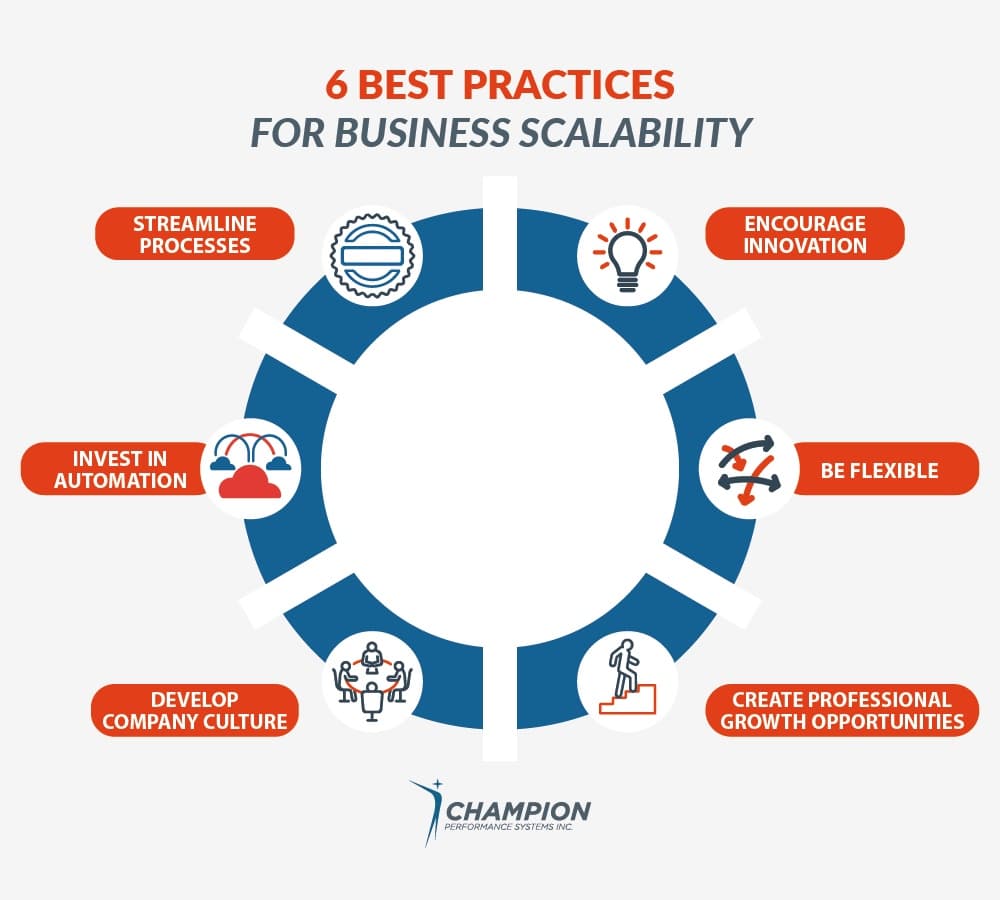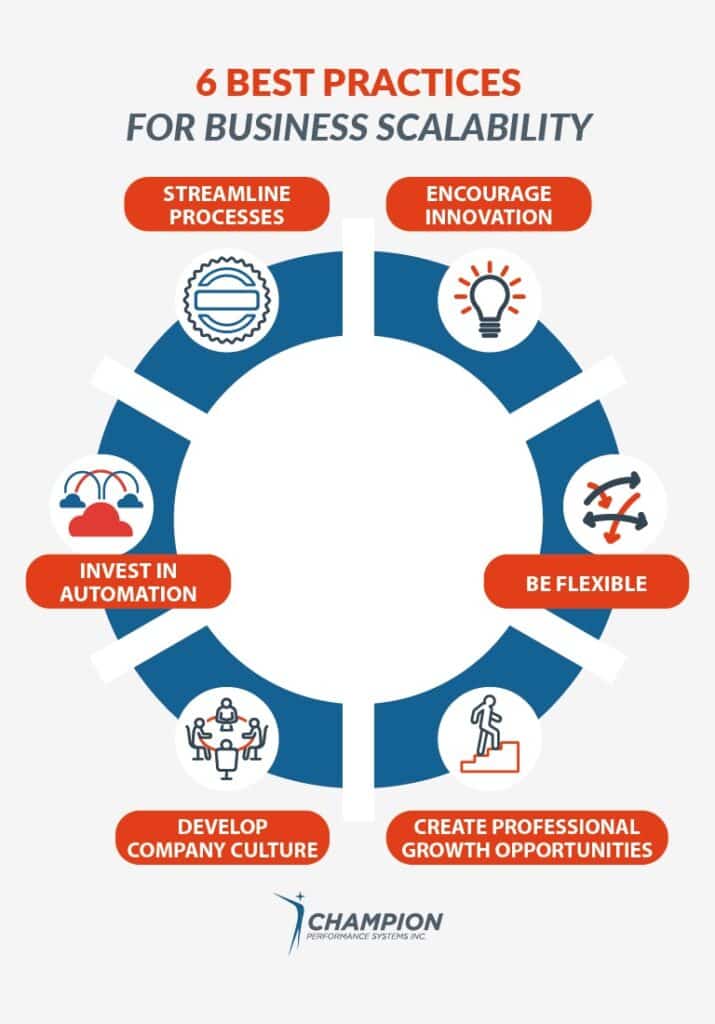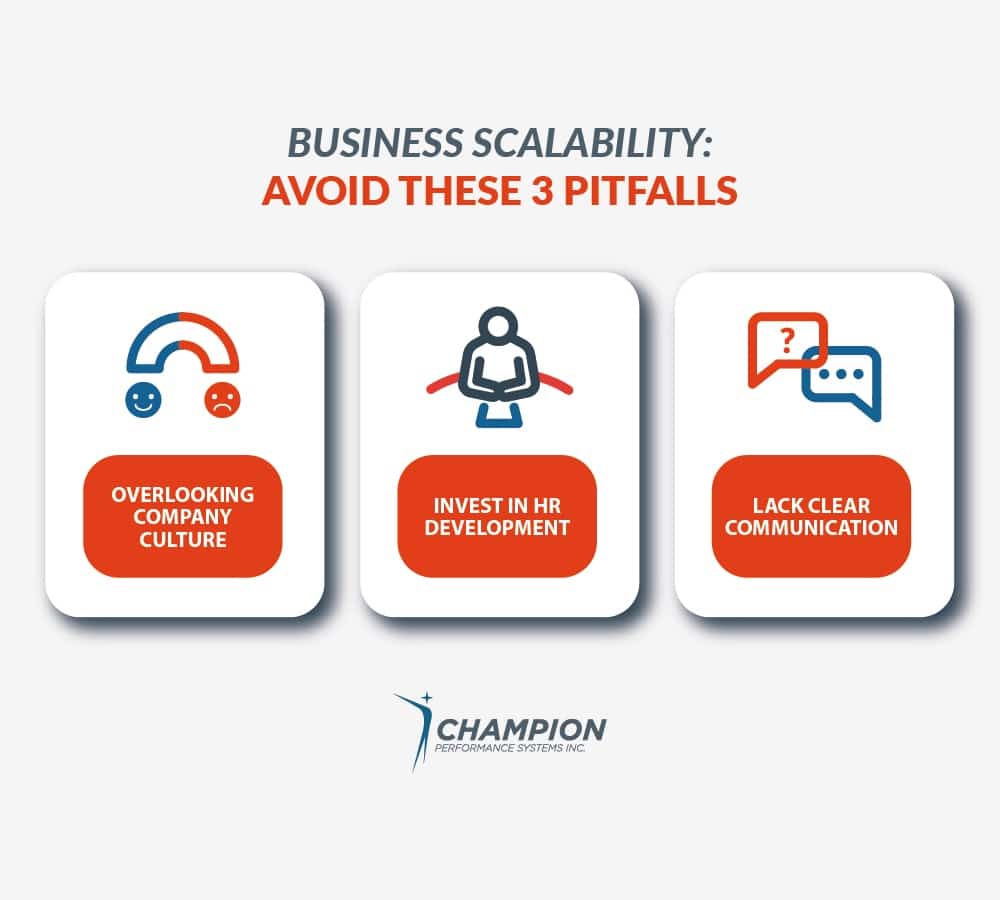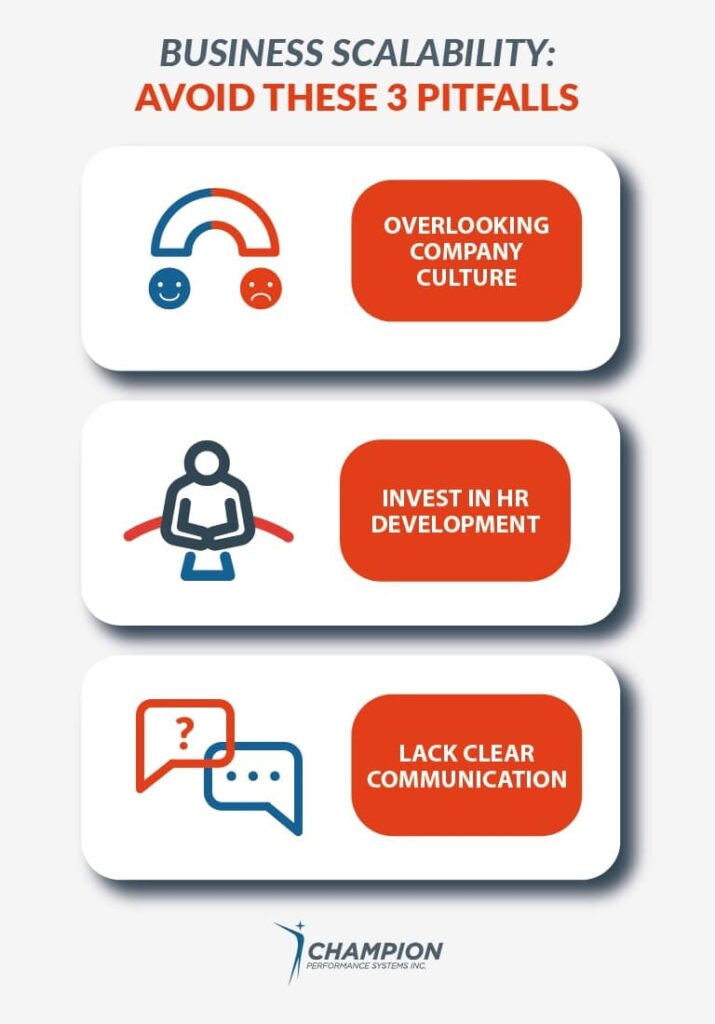In today’s competitive business landscape, planning for scalability is crucial for long-term success and growth.
As CEOs, executives, entrepreneurs, and family businesses aim to expand their operations, having a well-crafted scaling plan can mean the difference between thriving and struggling. In this blog post, we will delve into the importance of scalability, discuss key factors that contribute to a scalable business model, and provide actionable tips and best practices to create a comprehensive scaling plan.
By understanding and implementing these strategies, you’ll be well-equipped to navigate the challenges and opportunities that come with business growth and improve your overall performance.
Understanding the Importance of Scalability in Business
Scalability plays a crucial role in the long-term success of any business. It refers to the ability of a company to grow and expand without being hindered by its structure or available resources. By planning for scalability, businesses can better accommodate growth, increase revenues, and enhance overall performance.
However, neglecting to plan for scalability can lead to potential risks. These include inefficiencies, bottlenecks, and even the inability to capitalize on new opportunities. In turn, this may result in reduced profitability, loss of market share, and ultimately, stagnation.
Therefore, understanding and addressing scalability is essential for businesses looking to achieve long-term success and sustained growth.
Identifying Key Factors in a Scalable Business Model
Revenue generation and profitability are the backbone of a scalable business model. Companies must ensure their products or services can generate consistent revenue and maintain profitability as they grow. This requires focusing on value proposition, pricing strategies, and market demand to ensure long-term financial sustainability.
Operational efficiency and flexibility play a vital role in scaling a business. Efficient processes and systems enable a company to handle increased workloads, minimize costs, and maximize output. Implementing flexible processes and systems allows a company to adapt quickly to changes in the business environment, which is crucial for successful scaling.
Human resources and talent management are key factors in a scalable business model. As a business grows, it needs a skilled and motivated workforce to support its expansion. An effective talent management strategy should include hiring, training, and retaining top talent while fostering a positive company culture. This ensures that the organization has the necessary human capital to drive growth and navigate the challenges that come with scaling.
Assessing Your Business's Scalability Potential
To effectively assess your business’s scalability potential, begin by evaluating your current business model. Analyze its strengths and weaknesses, and determine how well it can handle growth. This includes identifying potential challenges, such as limited resources or capacity constraints, which could hinder your ability to scale.
Next, pinpoint existing bottlenecks and areas for improvement within your operations, processes, and systems. These may be preventing your business from reaching its full potential and should be addressed before scaling. Also, consider any market trends or industry shifts that may impact your growth strategy.
Setting realistic goals and expectations for growth is crucial. Establish clear objectives and benchmarks for expansion, taking into account the resources and time needed to achieve them.
Ensure that these goals are aligned with your overall business strategy and vision, and consider the potential risks and trade-offs associated with scaling. By thoroughly assessing your business’s scalability potential, you can make informed decisions and create a robust plan to support sustainable growth.
Developing a Comprehensive Scaling Plan
After assessing your business’s scalability potential, it’s time to develop a comprehensive scaling plan.
Begin by clearly defining the desired outcomes of expansion and laying out strategies for achieving them. This can include developing pricing models, expanding into new markets or channels, and diversifying service offerings. It’s also important to identify resources that are essential for scaling and determine how best to allocate them to optimize performance.
One of the core components of a comprehensive scaling plan is the establishment of an effective communication and decision-making framework. This framework facilitates collaboration and coordination among team members, allowing for the efficient execution of the scaling strategy. Additionally, it helps to foster a shared vision and understanding of the organization’s goals, enabling stakeholders to work in unison toward achieving these objectives.
When developing your scaling plan, consider both short-term and long-term growth objectives. This will help you to create a balanced approach that addresses immediate needs while also laying the foundation for sustained success. Furthermore, be sure to incorporate contingency planning and risk management strategies to account for potential challenges and setbacks that may arise during the scaling process.
Implementing Best Practices for Business Scalability


Streamlining processes and investing in automation is essential for implementing best practices in scalability. By simplifying and automating routine tasks, businesses can reduce operational costs, increase efficiency, and free up valuable time for employees to focus on more strategic initiatives. This not only improves the overall operational performance but also fosters innovation and growth.
Developing a strong company culture and employee engagement is another crucial aspect of ensuring successful scalability. A positive work environment that encourages collaboration, innovation, and open communication can help attract and retain top talent, which is essential for sustaining growth.
Providing opportunities for professional development and growth, as well as recognizing and rewarding employees’ contributions, can also boost their motivation and commitment to the company’s vision and goals.
Lastly, the ability to change and innovate is key for successful scalability. As the market conditions and industry trends change, organizations need to be flexible and agile in order to seize new opportunities and address emerging challenges.
Encouraging a mindset of ongoing learning and development among team members, as well as being open to feedback and innovative ideas, can help businesses stay ahead of the competition and maintain their growth trajectory.
Monitoring and Adjusting Your Scaling Strategy
Periodically reviewing and updating your scaling plan is essential to keep pace with the evolving business environment and changing market conditions.
This process involves reassessing your goals, objectives, and strategies, as well as analyzing the results of your scaling initiatives. It is important to remain open to modifying your plan based on new information or feedback, ensuring your scaling strategy remains relevant and effective.
Also, remember that scalability involves more than just putting plans into action. Business landscapes are constantly shifting, and your ability to respond and adjust to these changes will play a significant role in determining your company’s growth trajectory.
Embrace an agile mindset and be prepared to pivot when necessary, allowing you to capitalize on emerging opportunities and mitigate potential risks.
Leveraging Technology to Support Scalability
In today’s fast-paced business world, technology plays a crucial role in enabling companies to scale efficiently and effectively. By identifying and investing in key technology solutions, businesses can streamline processes, reduce costs, and enhance overall performance.
Cloud-based solutions are becoming increasingly popular for scalability. This enables companies to respond quickly and cost-effectively to increased workloads or changes in customer demand. It also opens up opportunities for leveraging artificial intelligence (AI), advancing data analytics, and achieving greater efficiency.
It’s essential to research and select technology solutions that align with your business needs, ensuring that they can seamlessly integrate with your existing systems and processes.
Another vital aspect of technology in scalability is the utilization of data analytics. Data-driven decision-making allows businesses to make more informed choices, optimize operations, and identify areas for improvement. By harnessing the power of data, companies can gain valuable insights and better understand their customers, markets, and overall performance.
Moreover, technology solutions can facilitate better communication and collaboration across teams and departments, which is crucial during times of growth and change. Implementing tools such as project management software, communication platforms, and cloud-based services can help keep everyone on the same page and ensure smooth execution of your scaling plan.
Leveraging technology to support scalability is a must for businesses aiming to grow in today’s competitive landscape. By investing in the right tools and solutions, or even undergoing a complete digital transformation, companies can improve efficiency, drive innovation, and stay ahead of the curve.
Successful Scalability Success Stories
Studying successful scalability strategies, such as those of established organizations and emerging startups, can be valuable in developing your scaling plan. By examining these case examples of a successful scaling strategy, you can identify common factors that contribute to effective scalability, allowing you to apply these insights to your scaling plan.
Here are a couple of examples of scaling success stories:
Airbnb
One example of a successful scalability strategy is Airbnb. The company successfully tapped into the gig economy by providing an online platform for customers to rent out their homes. The company focused on building a strong community-driven platform and prioritized user experience to drive customer loyalty.
Through strategic partnerships, global expansion, and continuous improvement of their platform, Airbnb became a dominant player in the short-term rental market. Key takeaways from their scalability strategy include the importance of building a strong brand and leveraging technology to streamline operations and expand globally.
Slack
Another case study worth considering is the growth of Slack, a communication platform for businesses. Slack achieved scalability by focusing on a specific target market – small businesses and startups – and creating a product that met their needs. As the platform gained popularity, Slack expanded to serve larger organizations, continuously improving its features to meet the diverse needs of its growing user base.
This demonstrates the value of understanding your target market and developing a useful product, as well as the importance of continuous improvement and innovation to maintain relevance and support growth.
Adapting a Scalability Plan Template to Your Business
To effectively adapt a scalability plan template to your business, it’s essential to identify the key elements that make up a successful and comprehensive scaling strategy.
These elements may include business objectives, growth projections, resource allocation, process improvements, technology investments, and performance metrics. By understanding the core components of a scalability plan, you’ll be better equipped to customize the template to fit your organization’s unique needs and goals.
Start by carefully evaluating your business’s specific requirements and growth objectives. This will help you determine which aspects of the scalability plan template are most relevant and valuable to your organization. Be sure to align the scalability plan with your overall business strategy, ensuring consistency in your approach to growth and expansion.
Next, tailor the template’s content to reflect your company’s industry, market position, and competitive landscape. This may involve modifying the language, examples, and case studies included in the template to make them more relevant and applicable to your business context.
When customizing the scalability plan template, it’s crucial to prioritize initiatives and investments that will have the most significant impact on your organization’s growth and performance. This may involve reallocating resources, streamlining processes, or investing in new technology solutions that align with your scalability objectives.
Lastly, ensure that your adapted scalability plan is flexible and adaptable to changing market conditions, industry trends, and internal business developments. Regularly review and update your plan to reflect new insights, opportunities, and challenges that may arise as your organization grows and evolves.
3 Common Pitfalls to Avoid in Scaling a Business


Scaling a business comes with its own set of challenges and pitfalls. Being aware of these common issues can help you proactively address them and ensure a smoother scaling process.
One common pitfall is overlooking the importance of company culture. As businesses grow, maintaining a strong and cohesive culture becomes increasingly challenging. It’s crucial to prioritize company culture and ensure that everyone, from new hires to long-term employees, understands and embraces the organization’s values and mission. Fostering a positive work environment and promoting open communication can help to prevent cultural issues from hindering your scaling efforts.
Another challenge in scaling a business is the failure to invest in talent and human resources development. Your team is one of your most valuable assets, and neglecting to nurture their skills and professional growth can lead to high employee turnover and decreased productivity. Implementing a robust talent management strategy, including regular training, feedback, and opportunities for career advancement, is essential for retaining top talent and fostering a motivated workforce as you scale.
Lastly, a lack of clear communication and alignment among leaders and team members can significantly hinder your scaling efforts. As businesses grow, so does the potential for miscommunication and misalignment among different departments or teams.
To avoid this, establish effective communication channels and ensure that all team members are well-informed about the company’s goals, objectives, and strategies. Encourage cross-functional collaboration and foster a culture of open dialogue to help your organization stay aligned and focused on achieving its scaling objectives.
Seeking Expert Advice and Support
Many business leaders and entrepreneurs often struggle with how to scale their organizations. To address these challenges, seeking expert advice or support can be beneficial.
These professionals bring valuable insights, knowledge, and expertise to the table, helping business leaders make informed decisions and avoid common pitfalls.
They can also assist in identifying opportunities for growth and improvement, as well as potential partnerships and collaborations that can propel the business forward.
In addition to seeking external expertise, it’s essential for business leaders to pursue ongoing education and learning opportunities. This can take the form of attending industry conferences, participating in workshops, or enrolling in specialized courses.
Continuous learning allows executives and managers to stay informed about the latest trends and best practices in scalability, ensuring they are well-equipped to adapt and respond to the ever-changing business landscape. By investing in expert advice and support, companies can significantly increase their chances of achieving long-term growth and success.
Ready to Create and Implement a Scalable Business Model?
As you embark on your journey to scale your business, remember that planning for scalability is an ongoing process that requires adaptability, continuous improvement, and a strong foundation in both your business model and company culture.
By leveraging the best practices and tips outlined in this post, you can create a robust scaling plan that addresses challenges, allows for growth, and ultimately improves your overall performance.
If you’re looking to take your business to new heights, consider partnering with Champion PSI, a business coaching and consulting firm that offers customized solutions to help leaders achieve personal and professional growth. Their team of experts can provide invaluable guidance as you create and execute your scalable plan, ensuring that you have the right strategies and support in place to reach your goals.
Don’t wait any longer to invest in the future of your business. Reach out to Champion PSI today or sign up to get a free “Scaling Up” assessment and start reaping the benefits of a well-executed scalability plan. Together, we can create a brighter future for your company and unlock your full growth potential.










